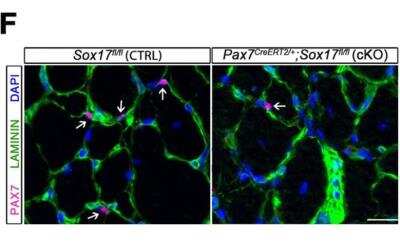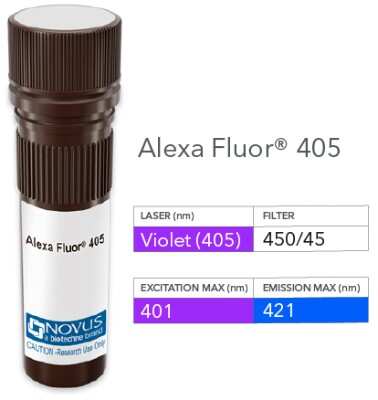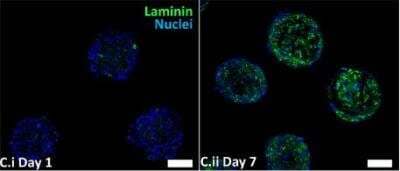Laminin Products
[[URL:https://www.novusbio.com/common-name/laminin]][[Caption:Laminin]], the most abundant structural and biologically active component in basement membranes, is a complex extracellular glycoprotein with high molecular weight (900 kDa). Laminin is composed of a laminin alpha (400 kDa), beta (215 kDa) and gamma chain (205 kDa), whose multidomain proteins are encoded by distinct genes (LAMA, LAMB, LAMC respectively) and have several isoforms of each chain. The biological functions of the different chains and trimer molecules are largely unknown, but some of the chains have been shown to differ with respect to their tissue distribution, reflecting diverse functions in vivo. Laminin is thought to mediate the attachment, migration and organization of cells into tissues during embryonic development by interacting with other [[URL:https://www.novusbio.com/research-areas/cancer/extracellular-matrix.htm… matrix]] components.
Laminins are an important and biologically active part of the basal lamina, influencing cell adhesion, differentiation, migration, [[URL:https://www.novusbio.com/research-areas/cell-biology/cell-signaling]][[…]], neurite outgrowth and [[URL:https://www.novusbio.com/research-areas/cancer/metastasis]][[Caption:me…]], where anti-laminin antibodies can be widely used to label blood vessels and basement membranes (1). Significant quantities of laminin are found in basement membranes, the thin extracellular matrices that surround epithelial tissue, nerve, fat cells and smooth, striated and cardiac muscle. Excessive serum laminin levels have been associated with fibrosis, cirrhosis and hepatitis, serious and frequent complications of chronic active liver disease characterized by excessive deposition of various normal components of connective tissue in liver (2). [[URL:https://www.novusbio.com/support/emt-and-stemness-faqs]][[Caption:Epith… mesenchymal transition (EMT)]] biomarkers include [[URL:https://www.novusbio.com/common-name/fibronectin]][[Caption:fibronectin]], laminin, [[URL:https://www.novusbio.com/common-name/n-cadherin]][[Caption:N-cadherin]], and [[URL:https://www.novusbio.com/common-name/slug]][[Caption:Slug]] (3).
References
1. Yang, M. Y., Chiao, M. T., Lee, H. T., Chen, C. M., Yang, Y. C., Shen, C. C., & Ma, H. I. (2015). An innovative three-dimensional gelatin foam culture system for improved study of glioblastoma stem cell behavior. J Biomed Mater Res B Appl Biomater, 103(3), 618-628. doi:10.1002/jbm.b.33214
2. Mak, K. M., & Mei, R. (2017). Basement Membrane Type IV Collagen and Laminin: An Overview of Their Biology and Value as Fibrosis Biomarkers of Liver Disease. Anat Rec (Hoboken), 300(8), 1371-1390. doi:10.1002/ar.23567
3. Choi, S., Yu, J., Park, A., Dubon, M. J., Do, J., Kim, Y., . . . Park, K. S. (2019). BMP-4 enhances epithelial mesenchymal transition and cancer stem cell properties of breast cancer cells via Notch signaling. Sci Rep, 9(1), 11724. doi:10.1038/s41598-019-48190-5
Show More
Laminins are an important and biologically active part of the basal lamina, influencing cell adhesion, differentiation, migration, [[URL:https://www.novusbio.com/research-areas/cell-biology/cell-signaling]][[…]], neurite outgrowth and [[URL:https://www.novusbio.com/research-areas/cancer/metastasis]][[Caption:me…]], where anti-laminin antibodies can be widely used to label blood vessels and basement membranes (1). Significant quantities of laminin are found in basement membranes, the thin extracellular matrices that surround epithelial tissue, nerve, fat cells and smooth, striated and cardiac muscle. Excessive serum laminin levels have been associated with fibrosis, cirrhosis and hepatitis, serious and frequent complications of chronic active liver disease characterized by excessive deposition of various normal components of connective tissue in liver (2). [[URL:https://www.novusbio.com/support/emt-and-stemness-faqs]][[Caption:Epith… mesenchymal transition (EMT)]] biomarkers include [[URL:https://www.novusbio.com/common-name/fibronectin]][[Caption:fibronectin]], laminin, [[URL:https://www.novusbio.com/common-name/n-cadherin]][[Caption:N-cadherin]], and [[URL:https://www.novusbio.com/common-name/slug]][[Caption:Slug]] (3).
References
1. Yang, M. Y., Chiao, M. T., Lee, H. T., Chen, C. M., Yang, Y. C., Shen, C. C., & Ma, H. I. (2015). An innovative three-dimensional gelatin foam culture system for improved study of glioblastoma stem cell behavior. J Biomed Mater Res B Appl Biomater, 103(3), 618-628. doi:10.1002/jbm.b.33214
2. Mak, K. M., & Mei, R. (2017). Basement Membrane Type IV Collagen and Laminin: An Overview of Their Biology and Value as Fibrosis Biomarkers of Liver Disease. Anat Rec (Hoboken), 300(8), 1371-1390. doi:10.1002/ar.23567
3. Choi, S., Yu, J., Park, A., Dubon, M. J., Do, J., Kim, Y., . . . Park, K. S. (2019). BMP-4 enhances epithelial mesenchymal transition and cancer stem cell properties of breast cancer cells via Notch signaling. Sci Rep, 9(1), 11724. doi:10.1038/s41598-019-48190-5
74 results for "Laminin" in Products
74 results for "Laminin" in Products
Laminin Products
[[URL:https://www.novusbio.com/common-name/laminin]][[Caption:Laminin]], the most abundant structural and biologically active component in basement membranes, is a complex extracellular glycoprotein with high molecular weight (900 kDa). Laminin is composed of a laminin alpha (400 kDa), beta (215 kDa) and gamma chain (205 kDa), whose multidomain proteins are encoded by distinct genes (LAMA, LAMB, LAMC respectively) and have several isoforms of each chain. The biological functions of the different chains and trimer molecules are largely unknown, but some of the chains have been shown to differ with respect to their tissue distribution, reflecting diverse functions in vivo. Laminin is thought to mediate the attachment, migration and organization of cells into tissues during embryonic development by interacting with other [[URL:https://www.novusbio.com/research-areas/cancer/extracellular-matrix.htm… matrix]] components.
Laminins are an important and biologically active part of the basal lamina, influencing cell adhesion, differentiation, migration, [[URL:https://www.novusbio.com/research-areas/cell-biology/cell-signaling]][[…]], neurite outgrowth and [[URL:https://www.novusbio.com/research-areas/cancer/metastasis]][[Caption:me…]], where anti-laminin antibodies can be widely used to label blood vessels and basement membranes (1). Significant quantities of laminin are found in basement membranes, the thin extracellular matrices that surround epithelial tissue, nerve, fat cells and smooth, striated and cardiac muscle. Excessive serum laminin levels have been associated with fibrosis, cirrhosis and hepatitis, serious and frequent complications of chronic active liver disease characterized by excessive deposition of various normal components of connective tissue in liver (2). [[URL:https://www.novusbio.com/support/emt-and-stemness-faqs]][[Caption:Epith… mesenchymal transition (EMT)]] biomarkers include [[URL:https://www.novusbio.com/common-name/fibronectin]][[Caption:fibronectin]], laminin, [[URL:https://www.novusbio.com/common-name/n-cadherin]][[Caption:N-cadherin]], and [[URL:https://www.novusbio.com/common-name/slug]][[Caption:Slug]] (3).
References
1. Yang, M. Y., Chiao, M. T., Lee, H. T., Chen, C. M., Yang, Y. C., Shen, C. C., & Ma, H. I. (2015). An innovative three-dimensional gelatin foam culture system for improved study of glioblastoma stem cell behavior. J Biomed Mater Res B Appl Biomater, 103(3), 618-628. doi:10.1002/jbm.b.33214
2. Mak, K. M., & Mei, R. (2017). Basement Membrane Type IV Collagen and Laminin: An Overview of Their Biology and Value as Fibrosis Biomarkers of Liver Disease. Anat Rec (Hoboken), 300(8), 1371-1390. doi:10.1002/ar.23567
3. Choi, S., Yu, J., Park, A., Dubon, M. J., Do, J., Kim, Y., . . . Park, K. S. (2019). BMP-4 enhances epithelial mesenchymal transition and cancer stem cell properties of breast cancer cells via Notch signaling. Sci Rep, 9(1), 11724. doi:10.1038/s41598-019-48190-5
Show More
Laminins are an important and biologically active part of the basal lamina, influencing cell adhesion, differentiation, migration, [[URL:https://www.novusbio.com/research-areas/cell-biology/cell-signaling]][[…]], neurite outgrowth and [[URL:https://www.novusbio.com/research-areas/cancer/metastasis]][[Caption:me…]], where anti-laminin antibodies can be widely used to label blood vessels and basement membranes (1). Significant quantities of laminin are found in basement membranes, the thin extracellular matrices that surround epithelial tissue, nerve, fat cells and smooth, striated and cardiac muscle. Excessive serum laminin levels have been associated with fibrosis, cirrhosis and hepatitis, serious and frequent complications of chronic active liver disease characterized by excessive deposition of various normal components of connective tissue in liver (2). [[URL:https://www.novusbio.com/support/emt-and-stemness-faqs]][[Caption:Epith… mesenchymal transition (EMT)]] biomarkers include [[URL:https://www.novusbio.com/common-name/fibronectin]][[Caption:fibronectin]], laminin, [[URL:https://www.novusbio.com/common-name/n-cadherin]][[Caption:N-cadherin]], and [[URL:https://www.novusbio.com/common-name/slug]][[Caption:Slug]] (3).
References
1. Yang, M. Y., Chiao, M. T., Lee, H. T., Chen, C. M., Yang, Y. C., Shen, C. C., & Ma, H. I. (2015). An innovative three-dimensional gelatin foam culture system for improved study of glioblastoma stem cell behavior. J Biomed Mater Res B Appl Biomater, 103(3), 618-628. doi:10.1002/jbm.b.33214
2. Mak, K. M., & Mei, R. (2017). Basement Membrane Type IV Collagen and Laminin: An Overview of Their Biology and Value as Fibrosis Biomarkers of Liver Disease. Anat Rec (Hoboken), 300(8), 1371-1390. doi:10.1002/ar.23567
3. Choi, S., Yu, J., Park, A., Dubon, M. J., Do, J., Kim, Y., . . . Park, K. S. (2019). BMP-4 enhances epithelial mesenchymal transition and cancer stem cell properties of breast cancer cells via Notch signaling. Sci Rep, 9(1), 11724. doi:10.1038/s41598-019-48190-5
Applications: IHC, WB, ICC/IF, Flow, B/N, KO
Reactivity:
Human,
Mouse,
Rat,
Primate,
Porcine, +8 More
| Reactivity: | Human, Mouse, Rat, Primate, Porcine, +8 More |
| Details: | Rabbit IgG Polyclonal |
| Applications: | IHC, WB, ICC/IF, Flow, B/N, +1 More |
Applications: IHC, WB, ICC/IF, ELISA
Reactivity:
Human,
Mouse,
Porcine,
Rat (Negative),
Feline, +8 More
| Reactivity: | Human, Mouse, Porcine, Rat (Negative), Feline, +8 More |
| Details: | Mouse IgG1 Monoclonal Clone #LAM-89 |
| Applications: | IHC, WB, ICC/IF, ELISA |
| Reactivity: | Human |
| Details: | Mouse IgG1 Monoclonal Clone #CL2968 |
| Applications: | IHC, WB |
| Applications: | ELISA, NULL |
Applications: IHC, WB
Reactivity:
Human
| Reactivity: | Human |
| Details: | Mouse IgG2a Kappa Monoclonal Clone #4C7 |
| Applications: | IHC, WB |
| Reactivity: | Human |
| Details: | Mouse IgG1 Monoclonal Clone #CL3087 |
| Applications: | IHC, WB |
| Applications: | ELISA, NULL |
| Reactivity: | Human |
| Details: | Rabbit IgG Polyclonal |
| Applications: | IHC |
| Applications: | ELISA, NULL |
| Reactivity: | Human, Mouse, Rat |
| Details: | Rat IgG1 Monoclonal Clone #MEC5 |
| Applications: | IHC |
Applications: IHC, WB, ICC/IF, Flow
Reactivity:
Human,
Mouse,
Rat,
Rabbit,
Sheep, +3 More
| Reactivity: | Human, Mouse, Rat, Rabbit, Sheep, +3 More |
| Details: | Rabbit IgG Polyclonal |
| Applications: | IHC, WB, ICC/IF, Flow |
Applications: IHC, WB, ICC/IF, Flow
Reactivity:
Human,
Mouse,
Rat,
Rabbit,
Sheep, +3 More
| Reactivity: | Human, Mouse, Rat, Rabbit, Sheep, +3 More |
| Details: | Rabbit IgG Polyclonal |
| Applications: | IHC, WB, ICC/IF, Flow |
| Reactivity: | Human |
| Details: | Mouse IgG1 Monoclonal Clone #CL2968 |
| Applications: | IHC, WB |
| Reactivity: | Human |
| Details: | Mouse IgG1 Monoclonal Clone #CL2968 |
| Applications: | IHC, WB |
| Reactivity: | Human |
| Details: | Mouse IgG1 Monoclonal Clone #CL2968 |
| Applications: | IHC, WB |
Applications: IHC, WB, ICC/IF, Flow
Reactivity:
Human,
Mouse,
Rat,
Rabbit,
Sheep, +3 More
| Reactivity: | Human, Mouse, Rat, Rabbit, Sheep, +3 More |
| Details: | Rabbit IgG Polyclonal |
| Applications: | IHC, WB, ICC/IF, Flow |
Applications: IHC, WB, ICC/IF, Flow
Reactivity:
Human,
Mouse,
Rat,
Rabbit,
Sheep, +3 More
| Reactivity: | Human, Mouse, Rat, Rabbit, Sheep, +3 More |
| Details: | Rabbit IgG Polyclonal |
| Applications: | IHC, WB, ICC/IF, Flow |
Applications: IHC, WB, ICC/IF, Flow
Reactivity:
Human,
Mouse,
Rat,
Rabbit,
Sheep, +3 More
| Reactivity: | Human, Mouse, Rat, Rabbit, Sheep, +3 More |
| Details: | Rabbit IgG Polyclonal |
| Applications: | IHC, WB, ICC/IF, Flow |
Applications: IHC, WB, ICC/IF, Flow
Reactivity:
Human,
Mouse,
Rat,
Rabbit,
Sheep, +3 More
| Reactivity: | Human, Mouse, Rat, Rabbit, Sheep, +3 More |
| Details: | Rabbit IgG Polyclonal |
| Applications: | IHC, WB, ICC/IF, Flow |
Applications: IHC, WB, ICC/IF, Flow
Reactivity:
Human,
Mouse,
Rat,
Rabbit,
Sheep, +3 More
| Reactivity: | Human, Mouse, Rat, Rabbit, Sheep, +3 More |
| Details: | Rabbit IgG Polyclonal |
| Applications: | IHC, WB, ICC/IF, Flow |
Applications: IHC, WB, ICC/IF, Flow
Reactivity:
Human,
Mouse,
Rat,
Rabbit,
Sheep, +3 More
| Reactivity: | Human, Mouse, Rat, Rabbit, Sheep, +3 More |
| Details: | Rabbit IgG Polyclonal |
| Applications: | IHC, WB, ICC/IF, Flow |
Applications: IHC, WB, ICC/IF, Flow
Reactivity:
Human,
Mouse,
Rat,
Rabbit,
Sheep, +4 More
| Reactivity: | Human, Mouse, Rat, Rabbit, Sheep, +4 More |
| Details: | Rabbit IgG Polyclonal |
| Applications: | IHC, WB, ICC/IF, Flow |
Applications: IHC, WB, ICC/IF, Flow
Reactivity:
Human,
Mouse,
Rat,
Rabbit,
Sheep, +3 More
| Reactivity: | Human, Mouse, Rat, Rabbit, Sheep, +3 More |
| Details: | Rabbit IgG Polyclonal |
| Applications: | IHC, WB, ICC/IF, Flow |
Applications: IHC, WB, ICC/IF, Flow
Reactivity:
Human,
Mouse,
Rat,
Rabbit,
Sheep, +3 More
| Reactivity: | Human, Mouse, Rat, Rabbit, Sheep, +3 More |
| Details: | Rabbit IgG Polyclonal |
| Applications: | IHC, WB, ICC/IF, Flow |
Applications: IHC, WB, ICC/IF, Flow
Reactivity:
Human,
Mouse,
Rat,
Rabbit,
Sheep, +3 More
| Reactivity: | Human, Mouse, Rat, Rabbit, Sheep, +3 More |
| Details: | Rabbit IgG Polyclonal |
| Applications: | IHC, WB, ICC/IF, Flow |


![Immunohistochemistry: Laminin Antibody (LAM-89) [NB600-883] Immunohistochemistry: Laminin Antibody (LAM-89) [NB600-883]](https://resources.bio-techne.com/images/products/Laminin-Antibody-LAM-89-Immunohistochemistry-NB600-883-img0006.jpg)
![Western Blot: Laminin Antibody (CL2968) [NBP2-42384] Western Blot: Laminin Antibody (CL2968) [NBP2-42384]](https://resources.bio-techne.com/images/products/Laminin-Antibody-CL2968-Western-Blot-NBP2-42384-img0008.jpg)
![ELISA: Mouse Laminin ELISA Kit (Colorimetric) [KA0380] ELISA: Mouse Laminin ELISA Kit (Colorimetric) [KA0380]](https://resources.bio-techne.com/images/products/Laminin-ELISA-Kit-[Biotin]-ELISA-KA0380-img0001.jpg)
![Immunohistochemistry-Paraffin: Laminin Antibody (4C7) [NB120-17107] Immunohistochemistry-Paraffin: Laminin Antibody (4C7) [NB120-17107]](https://resources.bio-techne.com/images/products/Laminin-Antibody-4C7-Immunohistochemistry-Paraffin-NB120-17107-img0002.jpg)
![Immunohistochemistry-Paraffin: Laminin Antibody (CL3087) [NBP2-42389] Immunohistochemistry-Paraffin: Laminin Antibody (CL3087) [NBP2-42389]](https://resources.bio-techne.com/images/products/Laminin-Antibody-CL3087-Immunohistochemistry-Paraffin-NBP2-42389-img0011.jpg)
![ELISA: Rat Laminin ELISA Kit (Colorimetric) [KA0379] ELISA: Rat Laminin ELISA Kit (Colorimetric) [KA0379]](https://resources.bio-techne.com/images/products/Laminin-ELISA-Kit-[Biotin]-ELISA-KA0379-img0001.jpg)
![Immunohistochemistry-Paraffin: Laminin Antibody [NBP2-34181] Immunohistochemistry-Paraffin: Laminin Antibody [NBP2-34181]](https://resources.bio-techne.com/images/products/LAMA1-Antibody-Immunohistochemistry-Paraffin-NBP2-34181-img0007.jpg)
![ELISA: Human Laminin ELISA Kit (Colorimetric) [KA1999] ELISA: Human Laminin ELISA Kit (Colorimetric) [KA1999]](https://resources.bio-techne.com/images/products/Laminin-ELISA-Kit-[Biotin]-ELISA-KA1999-img0001.jpg)



